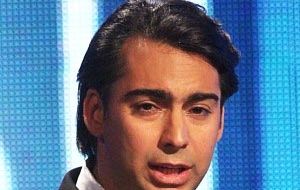MercoPress. South Atlantic News Agency
Conservative Piñera faces tougher race in Chile’s January 17 run-off
 Discontent materialized in the strong showing of Marco Enriquez Ominami
Discontent materialized in the strong showing of Marco Enriquez Ominami Chilean Conservative candidate Sebastián Piñera moved on Sunday a step closer to the presidency but he now faces a tougher run-off January 17 when the government is expected to again put its full weight behind incumbent candidate and former president Eduardo Frei in alliance with the Communists.
According to the latest official vote count early Monday, Piñera garnered 44% of the vote; Frei, 29/30%; Communist candidate Jorge Arrate, 6.2% and maverick Marco Enriquez Ominami (41), MEO, 20%.
The ruling coalition Concertacion which has monopolized power since the return of democracy in 1989, can count with the 6% of Arrate but MEO is a big question mark.
“Piñera and Frei are not change or the future; they look too much alike. We have nothing to discuss with them, if they want the vote of our people, listen to their demands, it’s that simple”, said the son of former Socialist senator Ominami, a few minutes after the first official results and tendencies were announced.
“You as responsible adults, free and sovereign will know what to do in the run-off”, he insisted. But what “is inevitable is the debate we started: it is here to stay; we are a new political force and a new majority in Chile” underlined MEO.
Frei’s simple mathematics shows that Mr. Arrate votes won’t be enough to defeat Pilñera so the big battle will be to convince MEO followers. MEO refers to a “new majority” since the Piñera coalition Alliance for Change is made up of Renovación Nacional and Union Democratica Independiente while the Concertación has two main parties: Freis’s Christian Democrats and President Michelle Bachelet Socialist.
An idea of what can be expected in the coming weeks was anticipated by President Bachelet: “The presidential election is not defined yet. Voters will again have to go to the ballot room January 17, which means almost a new election”.
She called on candidates for “a debate on ideas, where no one looses sight of national interest and common good”. Bachelet ended her brief speech congratulating the three Communist members of the Lower House, the first time they are elected since 1989 because of the complicated Chilean electoral system that bars small parties.
Piñera in his celebration speech called on Frei for a “clean campaign” in the coming 35 days, a “campaign of ideas and proposals” with no abuse or intervention from government institutions or “massive display of government resources”.
Piñera said that in a modern democracy, “popularities and support are not inherited or transferred: you must win them in the field with ideas and projects”. Finally he called on MEO’s voters saying that “leaving aside legitimate differences, I have always valued Marco’s vitality, frankness, openness and courage”.
But above all “we share with Marco and his followers the diagnosis that the ruling Concertación is exhausted, they have been too long in office and they have fallen into corruption temptations and incompetence and inefficiency”. It is time for the “political parties’ cupolas to step aside and let the new ideas and new generations in”.
Former president Ricardo Lagos who has promised to campaign for Frei clearly marked the field for the coming battle: “this is a confrontation between two options: ours where the State commands and the other, the right wing where market rules govern”.
Although Chile is seen as a show case of efficiency and prosperity, and has managed to address the world slowdown with the accumulated windfalls from years of abundance, there is growing discontent, particularly among the new generations.
Voting in Chile is compulsory for those registered but it is estimated that almost three million, mostly young people, have not shown an interest in voting and therefore the registry is almost the same in total numbers as it was four years ago (just over 8 million).
Mr. Frei, 67, and a rather dull and insipid candidate has been unable to counter the options of change promised by Piñera and particularly MEO. He has had to count heavily on the prestige of outgoing Ms Bachelet who has a personal support of over 82%, according to opinion polls.




Top Comments
Disclaimer & comment rulesCommenting for this story is now closed.
If you have a Facebook account, become a fan and comment on our Facebook Page!